Blog
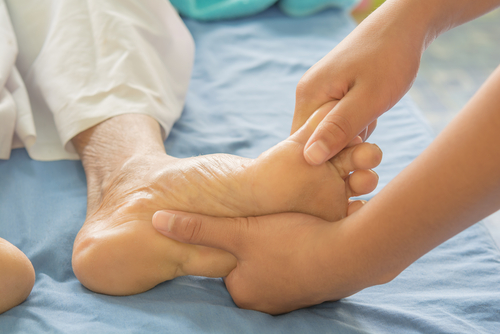
As people age, the feet undergo changes that can lead to discomfort and mobility challenges. Years of wear and tear, in addition to conditions such as arthritis or diabetes, can cause pain, swelling, and stiffness. The natural thinning of the fat pads that cushion the feet may increase foot pain when walking and standing. Furthermore, reduced bone density, particularly seen in post-menopausal women, can increase the risk of stress fractures. Joint inflammation and nerve damage, often associated with aging, can also affect balance and increase the likelihood of falls. Poor circulation, common in older adults, can delay healing and make the feet more susceptible to injuries or infections. A podiatrist can assess the type of foot pain you have and recommend custom orthotics, certain medication to relieve pain, or ways to enhance mobility. If you are a senior suffering from foot pain, it is suggested that you schedule an appointment with a podiatrist for a diagnosis and treatment options.
Proper foot care is something many older adults forget to consider. If you have any concerns about your feet and ankles, contact one of our doctors from New England Foot & Ankle . Our doctors can provide the care you need to keep you pain-free and on your feet.
The Elderly and Their Feet
As we age we start to notice many changes in our body, but the elder population may not notice them right away. Medical conditions may prevent the elderly to take notice of their foot health right away. Poor vision is a lead contributor to not taking action for the elderly.
Common Conditions
- Neuropathy – can reduce feeling in the feet and can hide many life-threatening medical conditions.
- Reduced flexibility – prevents the ability of proper toenail trimming, and foot cleaning. If left untreated, it may lead to further medical issues.
- Foot sores – amongst the older population can be serious before they are discovered. Some of the problematic conditions they may face are:
- Gouging toenails affecting nearby toe
- Shoes that don’t fit properly
- Pressure sores
- Loss of circulation in legs & feet
- Edema & swelling of feet and ankles
Susceptible Infections
Diabetes and poor circulation can cause general loss of sensitivity over the years, turning a simple cut into a serious issue.
If you have any questions please feel free to contact our offices located in Wakefield, MA, Nashua and Derry, NH . We offer the newest diagnostic and treatment technologies for all your foot and ankle needs.
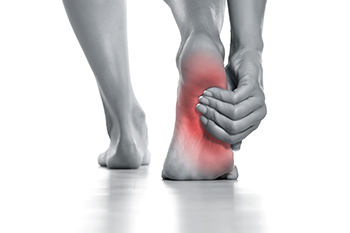
Heel pain can sometimes be traced to nerve compression, specifically when nerves in the heel become pinched between surrounding bones, ligaments, and connective tissue. This is known as medial and lateral plantar nerve entrapment. It can lead to nearly constant pain that worsens with activities like standing, walking, and running. High-impact activities and certain footwear can intensify the heel pain, making it challenging for people to perform daily tasks comfortably. Unlike other nerve issues, this type of entrapment typically does not cause burning or tingling. Instead it produces a more constant, deep ache. Diagnosis of this condition requires a thorough examination by a podiatrist, who may recommend supportive orthotic devices to stabilize the foot and alleviate pressure. Wearing splints can also help manage symptoms. In more severe cases, additional treatments like cryotherapy or surgery might be considered. If you are experiencing heel pain, it is suggested that you make an appointment with a podiatrist for a diagnosis, exam, and treatment options.
Many people suffer from bouts of heel pain. For more information, contact one of our doctors of New England Foot & Ankle . Our doctors can provide the care you need to keep you pain-free and on your feet.
Causes of Heel Pain
Heel pain is often associated with plantar fasciitis. The plantar fascia is a band of tissues that extends along the bottom of the foot. A rip or tear in this ligament can cause inflammation of the tissue.
Achilles tendonitis is another cause of heel pain. Inflammation of the Achilles tendon will cause pain from fractures and muscle tearing. Lack of flexibility is also another symptom.
Heel spurs are another cause of pain. When the tissues of the plantar fascia undergo a great deal of stress, it can lead to ligament separation from the heel bone, causing heel spurs.
Why Might Heel Pain Occur?
- Wearing ill-fitting shoes
- Wearing non-supportive shoes
- Weight change
- Excessive running
Treatments
Heel pain should be treated as soon as possible for immediate results. Keeping your feet in a stress-free environment will help. If you suffer from Achilles tendonitis or plantar fasciitis, applying ice will reduce the swelling. Stretching before an exercise like running will help the muscles. Using all these tips will help make heel pain a condition of the past.
If you have any questions please contact our offices located in Wakefield, MA, Nashua and Derry, NH . We offer the newest diagnostic and treatment technologies for all your foot and ankle needs.
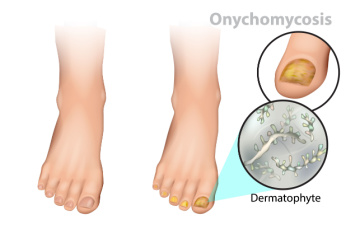
Fungal toenail infections are common and can affect anyone, especially those frequently exposed to warm, moist environments. Toenail infections often start subtly but can progress to cause noticeable changes in the toenail, including discoloration, thickening, and brittleness. Infected nails may turn yellow, green, or even black, and as they thicken, they may become challenging to trim. Patients might also experience discomfort, particularly when pressure is applied to the affected area. Fungi that cause the infection thrive in communal areas like showers, locker rooms, and gyms, where people are more likely to walk barefoot. Certain conditions, such as diabetes, a weakened immune system, or poor circulation, can increase susceptibility. A podiatrist can evaluate the severity of a fungal toenail infection and recommend effective treatment options, which may include topical or oral antifungal medications. If your toenails have been infected, it is suggested that you schedule an appointment with a podiatrist for an exam and treatment.
For more information about treatment, contact one of our doctors of New England Foot & Ankle . Our doctors can provide the care you need to keep you pain-free and on your feet.
Toenail Fungus Treatment
Toenail fungus is a condition that affects many people and can be especially hard to get rid of. Fortunately, there are several methods to go about treating and avoiding it.
Antifungals & Deterrence
Oral antifungal medicine has been shown to be effective in many cases. It is important to consult with a podiatrist to determine the proper regiment for you, or potentially explore other options.
Applying foot powder on the feet and shoes helps keep the feet free of moisture and sweat.
Sandals or open toed shoes – Wearing these will allow air movement and help keep feet dry. They also expose your feet to light, which fungus cannot tolerate. Socks with moisture wicking material also help as well.
If you have any questions please feel free to contact our offices located in Wakefield, MA, Nashua and Derry, NH . We offer the newest diagnostic tools and technology to treat your foot and ankle needs.

Achilles tendinopathy is a condition marked by pain, stiffness, and swelling in the Achilles tendon, often caused by repetitive strain or overuse. The Achilles tendon connects the calf muscles to the heel bone, and it plays a critical role in walking, running, and jumping. Achilles tendinopathy typically occurs when there is an increase in activity intensity, wearing improper footwear, or inadequate warm-ups. Individuals at higher risk include athletes, runners, and middle-aged adults who engage in sudden or intense physical activity. Treatment focuses on reducing pain and inflammation, in addition to strengthening the tendon. In some cases, orthotics or heel lifts are recommended to relieve stress on the tendon. With consistent podiatric treatment, most patients experience reduced symptoms and improved function, although recovery may take several months depending on the severity of the condition. If you are experiencing Achilles pain, it is suggested that you visit a podiatrist for a proper diagnosis and treatment.
Achilles tendon injuries need immediate attention to avoid future complications. If you have any concerns, contact one of our doctors of New England Foot & Ankle . Our doctors can provide the care you need to keep you pain-free and on your feet.
What Is the Achilles Tendon?
The Achilles tendon is a tendon that connects the lower leg muscles and calf to the heel of the foot. It is the strongest tendon in the human body and is essential for making movement possible. Because this tendon is such an integral part of the body, any injuries to it can create immense difficulties and should immediately be presented to a doctor.
What Are the Symptoms of an Achilles Tendon Injury?
There are various types of injuries that can affect the Achilles tendon. The two most common injuries are Achilles tendinitis and ruptures of the tendon.
Achilles Tendinitis Symptoms
- Inflammation
- Dull to severe pain
- Increased blood flow to the tendon
- Thickening of the tendon
Rupture Symptoms
- Extreme pain and swelling in the foot
- Total immobility
Treatment and Prevention
Achilles tendon injuries are diagnosed by a thorough physical evaluation, which can include an MRI. Treatment involves rest, physical therapy, and in some cases, surgery. However, various preventative measures can be taken to avoid these injuries, such as:
- Thorough stretching of the tendon before and after exercise
- Strengthening exercises like calf raises, squats, leg curls, leg extensions, leg raises, lunges, and leg presses
If you have any questions please feel free to contact our offices located in Wakefield, MA, Nashua and Derry, NH . We offer the newest diagnostic tools and technology to treat your foot and ankle needs.
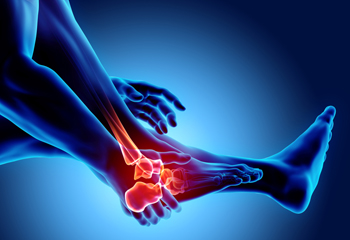
Juvenile idiopathic arthritis, or JIA, is a chronic condition in children that causes joint inflammation, often affecting the feet and ankles. Foot involvement in JIA can lead to pain, swelling, stiffness, and difficulty walking. Over time, this inflammation may cause joint deformities or growth issues in the bones and soft tissues of the foot, affecting a child's mobility and quality of life. A podiatrist plays a key role in managing foot impairments in children with JIA. They can provide custom orthotics to support the foot, reduce pressure on affected joints, and improve walking comfort. Additionally, they may recommend exercises to maintain range of motion and suggest modifications to footwear to accommodate swelling or deformities. If you have a child with JIA, it is strongly suggested that you visit a podiatrist regularly to ensure foot issues are addressed early and long-term complications are prevented.
Arthritis can be a difficult condition to live with. If you are seeking treatment, contact one of our doctors from New England Foot & Ankle . Our doctors can provide the care you need to keep you pain-free and on your feet.
Arthritic Foot Care
Arthritis is a joint disorder that involves the inflammation of different joints in your body, such as those in your feet. Arthritis is often caused by a degenerative joint disease and causes mild to severe pain in all affected areas. In addition to this, swelling and stiffness in the affected joints can also be a common symptom of arthritis.
In many cases, wearing ill-fitting shoes can worsen the effects and pain of arthritis. Wearing shoes that have a lower heel and extra room can help your feet feel more comfortable. In cases of rheumatoid arthritis, the arch in your foot may become problematic. Buying shoes with proper arch support that contour to your feet can help immensely.
Alleviating Arthritic Pain
- Exercises that stretch the foot can prevent further pain and injury and increase mobility
- Most of the pain can be alleviated with anti-inflammatory drugs, heat, and topical medications
- Massages can help temporarily alleviate pain.
It is best to see your doctor for the treatment that is right for your needs and symptoms. Conditions vary, and a podiatrist can help you determine the right method of care for your feet.
If you have any questions, please feel free to contact our offices located in Wakefield, MA, Nashua and Derry, NH . We offer the newest diagnostic tools and technology to treat your foot and ankle needs.
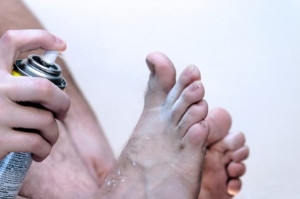
Athlete's foot, or tinea pedis, is a common fungal infection that primarily affects the skin between the toes. It thrives in warm, moist environments, making sweaty feet and tight shoes perfect breeding grounds. Symptoms often include itching, burning, peeling skin, and sometimes blisters or sores. If left untreated, the infection can spread to the toenails or other parts of the body. While antifungal creams and powders might help mild cases, severe or persistent symptoms may require medical intervention. If you experience intense pain, swelling, or signs of a secondary bacterial infection, such as redness or discharge, it is important to see a podiatrist. This type of doctor may prescribe stronger antifungal medications or investigate underlying conditions that could be contributing to the problem. If symptoms persist, it is suggested you schedule an appointment with a podiatrist for expert care and tailored treatment options.
Athlete’s foot is an inconvenient condition that can be easily reduced with the proper treatment. If you have any concerns about your feet and ankles, contact one of our doctors from New England Foot & Ankle . Our doctors will treat your foot and ankle needs.
Athlete’s Foot: The Sole Story
Athlete's foot, also known as tinea pedis, can be an extremely contagious foot infection. It is commonly contracted in public changing areas and bathrooms, dormitory style living quarters, around locker rooms and public swimming pools, or anywhere your feet often come into contact with other people.
Solutions to Combat Athlete’s Foot
- Hydrate your feet by using lotion
- Exfoliate
- Buff off nails
- Use of anti-fungal products
- Examine your feet and visit your doctor if any suspicious blisters or cuts develop
Athlete’s foot can cause many irritating symptoms such as dry and flaking skin, itching, and redness. Some more severe symptoms can include bleeding and cracked skin, intense itching and burning, and even pain when walking. In the worst cases, Athlete’s foot can cause blistering as well. Speak to your podiatrist for a better understanding of the different causes of Athlete’s foot, as well as help in determining which treatment options are best for you.
If you have any questions please feel free to contact our offices located in Wakefield, MA, Nashua and Derry, NH . We offer the newest diagnostic and treatment technologies for all your foot and ankle needs.
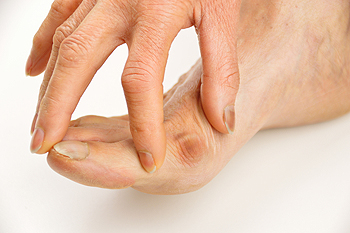
Bunions are bony protrusions that form at the base of the big toe, causing it to angle inward toward the other toes. This misalignment can lead to pain, swelling, and difficulty finding comfortable footwear. As bunions progress, they can also result in inflammation and increased pressure on the other toes, leading to additional foot problems. The causes of bunions can vary, but they are often linked to genetics, improper footwear, especially narrow or high-heeled shoes, and certain medical conditions. While conservative treatments like padding, orthotics, and wearing appropriate shoes can provide relief, severe cases may require surgical intervention. If you are experiencing foot pain or notice the development of a bunion, it is important to address the issue early. Do not let bunions disrupt your daily life. It is suggested you schedule an appointment with a podiatrist. They can assess your condition, recommend treatment options, and help you regain foot comfort.
If you are suffering from bunion pain, contact one of our doctors of New England Foot & Ankle . Our doctors can provide the care you need to keep you pain-free and on your feet.
What Is a Bunion?
Bunions are painful bony bumps that usually develop on the inside of the foot at the joint of the big toe. As the deformity increases over time, it may become painful to walk and wear shoes. Women are more likely to exacerbate existing bunions since they often wear tight, narrow shoes that shift their toes together. Bunion pain can be relieved by wearing wider shoes with enough room for the toes.
Causes
- Genetics – some people inherit feet that are more prone to bunion development
- Inflammatory Conditions - rheumatoid arthritis and polio may cause bunion development
Symptoms
- Redness and inflammation
- Pain and tenderness
- Callus or corns on the bump
- Restricted motion in the big toe
In order to diagnose your bunion, your podiatrist may ask about your medical history, symptoms, and general health. Your doctor might also order an x-ray to take a closer look at your feet. Nonsurgical treatment options include orthotics, padding, icing, changes in footwear, and medication. If nonsurgical treatments don’t alleviate your bunion pain, surgery may be necessary.
If you have any questions, please feel free to contact our offices located in Wakefield, MA, Nashua and Derry, NH . We offer the newest diagnostic and treatment technologies for all your foot care needs.

Foot arch pain can affect daily activities and reduce the overall quality of life. Symptoms typically include sharp or aching discomfort along the arch of the foot, especially after prolonged standing, walking, or engaging in physical activity. You might also experience swelling or tenderness, which can make finding comfortable footwear a challenge. Treatment options for foot arch pain often begin with stretching exercises for the calf muscles and plantar fascia which can improve flexibility and alleviate pain. Supportive footwear, along with custom orthotics, can provide arch support and cushioning. In more severe cases, a podiatrist may recommend specific treatments tailored to your condition. If you are experiencing persistent foot arch pain, it is important to schedule an appointment with a podiatrist. This type of doctor can evaluate your symptoms and recommend an effective treatment plan to help you get back on your feet comfortably.
Foot Pain
Foot pain can be extremely painful and debilitating. If you have a foot pain, consult with one of our doctors from New England Foot & Ankle . Our doctors will assess your condition and provide you with quality foot and ankle treatment.
Causes
Foot pain is a very broad condition that could be caused by one or more ailments. The most common include:
- Bunions
- Hammertoes
- Plantar Fasciitis
- Bone Spurs
- Corns
- Tarsal Tunnel Syndrome
- Ingrown Toenails
- Arthritis (such as Gout, Rheumatoid, and Osteoarthritis)
- Flat Feet
- Injury (from stress fractures, broken toe, foot, ankle, Achilles tendon ruptures, and sprains)
- And more
Diagnosis
To figure out the cause of foot pain, podiatrists utilize several different methods. This can range from simple visual inspections and sensation tests to X-rays and MRI scans. Prior medical history, family medical history, and any recent physical traumatic events will all be taken into consideration for a proper diagnosis.
Treatment
Treatment depends upon the cause of the foot pain. Whether it is resting, staying off the foot, or having surgery; podiatrists have a number of treatment options available for foot pain.
If you have any questions, please feel free to contact our offices located in Wakefield, MA, Nashua and Derry, NH . We offer the newest diagnostic and treatment technologies for all your foot care needs.
Blog Archives
- 2025
- 2024
- 2023


